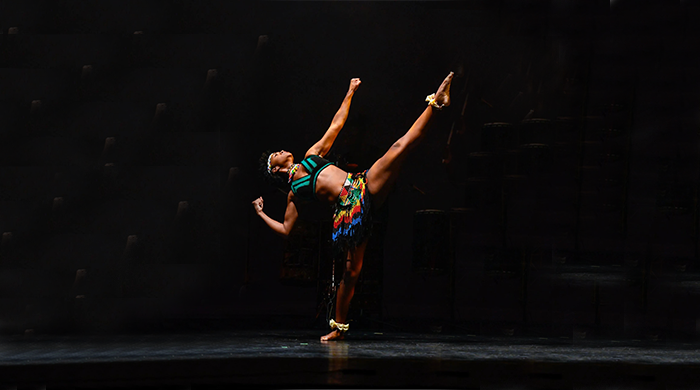Opera. The word conjures images of ornate theaters where dramatic plots unfold with lavish sets and costumes.
What makes “Carmen Inside Out,” a new performance by Kirstin Chavez, distinct is that it reverses these clichés. Rather than distance her audiences from her performance, Chavez invites us to engage with Carmen as a human being. She literally places us onstage with her and a handful of props. A pianist is her only accompaniment, and the production is breath-taking. Suddenly opera is intimate and relevant: Carmen is not only charismatic and compassionate, she’s also one of us.
As a faculty member in the School of Dance, I teach courses in history and theory, and know very little about opera. “Carmen Inside Out” makes me want to learn everything I can about Georges Bizet and this iconic feminist. As Chavez said during the post-performance discussion, performing Carmen grants her entrée into a more confident character than herself, and she has learned a great deal from her. These insights added to Chavez’s tour de force: the performance itself was stellar, with Chavez singing, dancing, and seducing us. She has performed this role for close to two decades and has collected effusive reviews, like this one from Opera News:
American mezzo Kirstin Chavez is the Carmen of a lifetime. With her dark, generous mezzo, earthy eroticism, volcanic spontaneity and smoldering charisma, Chavez has it all, including a superb command of French and a sense of humor. And she can dance, too. (Larry L. Lash, OPERA NEWS)
What makes Chavez appearance in the UtahPresents 2018-19 season stellar is that she condenses a four-act narrative into one hour and then invites us into a conversation about the challenges and freedoms she has discovered in this character. On Thursday night, Dr. Sarah Projansky, film and gender scholar at the U, moderated the post-show discussion and connected the vilification of strong women like Carmen to today’s news coverage that demonizes independent women. Playwright Kathleen Cahill, who wrote “Fatal Song” about the preponderance of female deaths in opera, enriched the conversation with her own insights: she described how painful it is to see one her characters “interpreted” in ways that destroy her intentions as their creator. Chavez echoed this sentiment when she recalled productions of Carmen that have distorted the title character’s vivacity and charm. In fact, both “Fatal Song” and “Carmen Inside Out” share a similar theme: they shed light on issues of women’s rights and question why a woman with integrity must die.
In a 2012 survey conducted by the National Endowment for the Arts, about 2 percent of adults in the United States who attend live performances go to opera. [for survey, see page 7: https://www.arts.gov/sites/default/files/2012-sppa-jan2015-rev.pdf] I couldn’t help but think of this statistic as I watched “Carmen Inside Out:” if audiences knew how riveting opera could be, I imagine there would be many more fans. Undoubtedly much of the appeal of this show is Chavez herself: she not only embodies the strength and creativity of Carmen, she’s also knows how to make opera compelling, current, and captivating.
Kate Mattingly is an Assistant Professor of Dance at the University of Utah.




